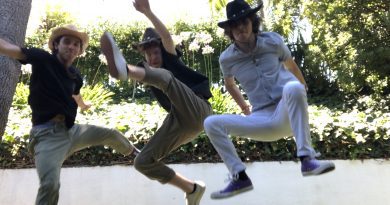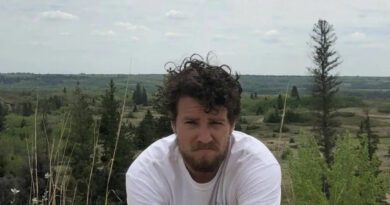A Chat with Gogo (29.04.25)
Emerging artist Gogo’s debut EP Rewind is more than just a sonic experience, it’s a raw, emotionally charged reclamation of artistic identity. From abandoning a nearly finished first project to diving headfirst into a more honest sound, Gogo has crafted a genre-defying body of work that resists easy classification. We speak with Gogo about the internal reckoning that sparked Rewind, the layered theme of escape woven through each track, and the ambitious creative vision that extends beyond music into film.
OSR: Rewind is such a sonically rich and emotionally layered EP. Where did the creative spark for this project first come from?
Gogo: I was mixing what I thought to be my debut EP, and in that process, I realised the music and the songs were not 100% me. Hearing it mixed, being confronted with a “finished” version made me see myself as the artist in a much clearer view. I saw a guy who was too anxious to let his inner sound fully through. Trying to be someone he wasn’t. Afraid not to know. I was disgusted by the finished EP and terribly disappointed that my, at that point, life’s work was just hollow sounds. No substance, nothing. At the time, I was working a lot in the studio on different projects, and writing as I always do late hours after long days of sessions. One night, something just clicked, and I made a beat with a sound I hadn’t heard before. Mixing all parts of me, but still being a singularity. Escaping the painful failure, I ran into it. A few months later, the album was done.
OSR: You’ve spoken about blending genres like alt-pop, soul, R&B, and rock. How do you approach merging such distinct sounds into one cohesive piece of work?
Gogo: As soon as I get an idea, I just hit record, grab whatever instrument/sample I have available and go. Play music and let it flow. I don’t know, I find genres uninteresting, I’ve never understood them. Maybe it’s the tool of people unable to tap into whatever is inside of them to make empirical sense of a supernatural phenomenon.
OSR: The theme of escape runs through the EP. Can you walk us through how that idea manifests in each track?
Gogo: Sure, I mean this brings us into the plot of the coming album and movie really, but the EP still has the same thought behind it, just a little less expansive. Rewind is about seizing to escaping and running. To finally be honest, to stop resisting and find rest. In this case, ironically, “run it back like deja vu”, Felicia is escaping into the false safety of Gogo’s charm and warmth. Gogo is with Felicia just to escape the thoughts of the love he lost. Both fleeing what they should do.
‘Cut Me Down’ is about wanting to escape when the world feels like too much. Also, the conflict of having nowhere to escape but into your own thoughts. And how can that corrupt us? ‘In Too Deep’ is the only song on the EP that’s not directly connected to escape. It’s about the moment when you’ve been seeing someone for some time, but neither of you knows if it’s gonna last. Both feeling the love but afraid to feed it. Scared of getting hurt or hurting the other. Sometimes that feels like gambling.
OSR: What was the most challenging song on the EP to write or produce, and why?
Gogo: All went very fast and very smooth, I was zoned in, can’t remember too much of the process. I just had a great time escaping the EP that I trashed.
OSR: You’ve compared your artistic inspiration to D’Angelo and Lauryn Hill – what is it about their approach that resonates so deeply with you?
Gogo: A lot, a lot. For me, they stand for a pure and truly unique vision embodied in a finished work, staying true to their inner voice. To make something unique and new but still timeless, you need to keep your artistry and vision pure without interference from outside. And at the same time, just being really human and just themselves. I don’t know if this is the way they thought or think, but it’s what I hear when listening to their music and it’s really inspiring.
OSR: Tell us about the decision to direct a film alongside the EP. How do the visuals enhance or expand the narrative of the music?
Gogo: The film is gonna be for the album; the EP is just a little taste of what’s to come. It’s easier to find people who understand who I am and what I do when my music is just a few clicks away. Every time I write or play, I see a movie in my head. So, making this album, I was in my head and body making the film, or at least the story and vivid visions of it. When the release was delayed and I had time to work on the videos, I realised that the album was not gonna be complete without the film. Also excited to explore the world of film and all the creative people in it. I believe art is about getting hold of an idea and then trying to bring it into the world in your personal way.
OSR: The music video shoot in Morocco sounds wild. How did that experience affect your connection to the song ‘Rewind?’
Gogo: Yes, it was a proper adventure. Not at all really, listening to the song, I just saw myself driving a car along a red sunset between dunes. So when we got the refund from our rental in NYC (which had turned out to be a bordello), the guys and I booked a place in Morocco. A couple of months later, we did the video, and it turned out fantastic, exactly the feeling I got from listening to it before. So for me, it is something that deepened the vision I already had.
OSR: You’ve kept this whole process independent. What are the biggest freedoms and limitations that come with working without a label or budget?
Gogo: The freedom is that it’s all up to you, endless. That enables me to dream big, and ideas are what get you anywhere; the most important thing. Then there is a lot of technical and worldly stuff to solve all the time. I try and succeed by just sticking to the core, allowing myself to feel and let the ideas flow with them.
OSR: How do you decide when a song or a project is “done”, especially when you’re producing everything yourself?
Gogo: I work on it ’til I realise I’m just recording lead vocal takes over and over. It gets out of hand sometimes. Somewhere around take 500, I usually realise that I should let it rest a bit. I try to let songs rest for a long time, at least 3-4 weeks. Fresh ears, minor changes, then done. Keep the original feeling. With that said, all of my songs have at least 20 versions.
OSR: What do you hope listeners walk away with after experiencing Rewind from start to finish?
Gogo: A question mark, like what is this, who did this, what is he saying, or whatever question pops up. The songs age very well, and I believe my sound needs time to set in the ear before you really get it.
Many thanks to Gogo for speaking with us. Find more about Gogo on his Instagram, YouTube, and Spotify.


